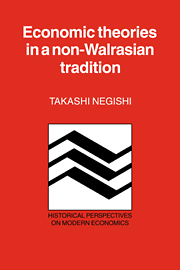Book contents
- Frontmatter
- Contents
- Preface
- 1 Anti-neoclassical or non-Walrasian economic theories
- Part I Increasing returns and diminishing cost
- Part II Wages and profit
- Part III International trade and investment
- Part IV Markets and money
- 12 Jevons, Edgeworth, and the competitive equilibrium of exchange
- 13 Menger's Absatzfähigkeit, a non-Walrasian theory of markets and money
- 14 The Marshallian foundation of macroeconomic theories
- Notes
- References
- Author index
- Subject index
12 - Jevons, Edgeworth, and the competitive equilibrium of exchange
from Part IV - Markets and money
Published online by Cambridge University Press: 21 September 2009
- Frontmatter
- Contents
- Preface
- 1 Anti-neoclassical or non-Walrasian economic theories
- Part I Increasing returns and diminishing cost
- Part II Wages and profit
- Part III International trade and investment
- Part IV Markets and money
- 12 Jevons, Edgeworth, and the competitive equilibrium of exchange
- 13 Menger's Absatzfähigkeit, a non-Walrasian theory of markets and money
- 14 The Marshallian foundation of macroeconomic theories
- Notes
- References
- Author index
- Subject index
Summary
Walras's regard for Jevons's contribution to the equilibrium theory of competitive exchange was not high since, as he pointed out in his letter to Jevons, the latter had failed to derive “the equation of effective demand as a function of price, which … is so indispensable for the solution of the problem of the determination of equilibrium price” (Walras 1965, p. 397). This is no wonder. Demand as a function of price implies that traders are price takers. Walras presupposed the existence of market prices accepted by competitive traders as data, in his theory of general equilibrium of competitive exchange. Jevons and Edgeworth tried to justify this Walrasian supposition by explaining such prices established in a competitive market as ratios of exchange eventually resulting from a process of free bargaining and arbitrage, without assuming price-taking behavior of competitive traders.
In a sense, Schumpeter recognized this difference between Walras and Jevons.
The Competitive Hypothesis. This notion had been made explicit by Cournot … after having started with the case of straight monopoly … he first introduced another seller and then additional ones until, by letting their number increase indefinitely, he finally arrived at the case of “illimited” (unlimited) competition, where the quantity produced by any one producer is too small to affect price perceptibly or to admit of price strategy. […]
- Type
- Chapter
- Information
- Economic Theories in a Non-Walrasian Tradition , pp. 147 - 157Publisher: Cambridge University PressPrint publication year: 1985
- 1
- Cited by



